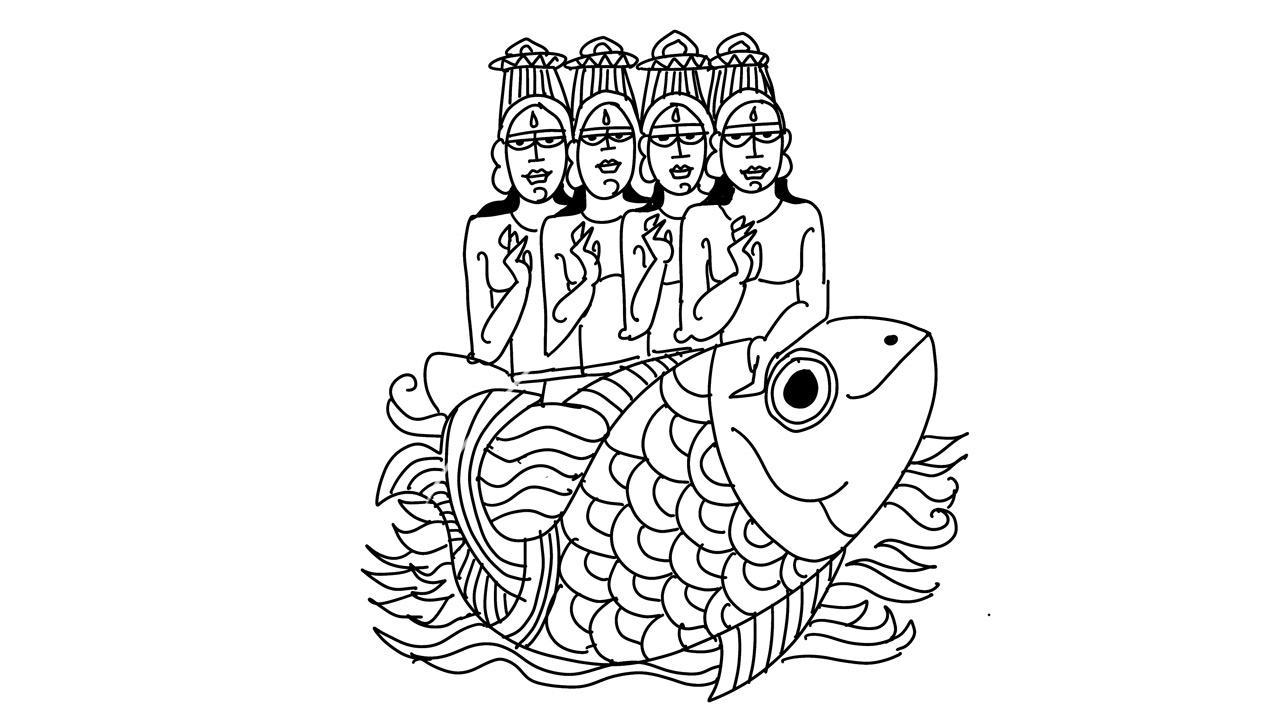In Buddhist Jataka, Buddha once turned himself into a red fish and offered his flesh to people to save them from starvation and cure them of a skin disease

Illustration/Devdutt Pattanaik
 Across India, the fish is a sacred symbol--all kinds of fish. The salt-water fish (Surmai), fresh-water fish (Goonch), fish of ponds (Rohu) and rivers (Mahseer, dolphins), fish of deltas that travel upstream to spawn (Palla, Hilsa). Fish is linked with autonomy as it cannot be tamed, and with fertility and prosperity. Brahmins who ate fish referred to it as “water-plants” (jala-taru).
Across India, the fish is a sacred symbol--all kinds of fish. The salt-water fish (Surmai), fresh-water fish (Goonch), fish of ponds (Rohu) and rivers (Mahseer, dolphins), fish of deltas that travel upstream to spawn (Palla, Hilsa). Fish is linked with autonomy as it cannot be tamed, and with fertility and prosperity. Brahmins who ate fish referred to it as “water-plants” (jala-taru).
ADVERTISEMENT
In Buddhist Jataka, Buddha once turned himself into a red fish and offered his flesh to people to save them from starvation and cure them of a skin disease. In another story, Buddha felt sorry for a male-fish caught in a net. Instead of worrying about its own death, the male-fish was worried for his wife who may be thinking that he eloped with another fish. Only the Buddha knew the truth: that the female-fish who had escaped the net had deliberately not warned her mate about the trap. She wanted to be free of him. The male fish was trapped internally by his passions and externally by the net.
The Mahseer fish is likely the inspiration behind the story of Vishnu’s Matsya Avatar. In Hindu mythology, a small fish asks Manu to save him from a larger fish, and later, when the fish grows into a giant fish, he saves Manu from a great flood. Vishnu wears fish-shaped earrings, a symbol of eternal movement, hence life. A fish overheard Shiva explaining the secret of Tantra to Shakti. That fish transformed into Matsyendranath, the eldest of the Nath-Jogis.
A pair of fish (Pisces) is a well-known fertility symbol, found in Chinese culture, Buddhism, and Jainism. It indicates fortune. So, it is part of wedding ceremonies in Bengal. It is said that a pair of Rohu fish once leapt onto the boat of a Nawab who was fighting for control over Lucknow. As a result, even today, the emblem of Lucknow features two leaping fish as heraldic symbols.
The freshwater dolphin (Makara), considered sacred, is the national fish of India and is believed to be the mount of the River Ganga. Pehad Baba, of Jammu and Punjab, is a folk deity worshipped as a snake and also associated with Mahseer fish. He brought the rivers full of fish to the regions where he is worshipped.
In Mahabharata, Satyavati, the grandmother of Kauravas and Pandavas is a fisherwoman. She was found in the belly of a fish. In Bhagavata, Krishna’s son Pradyumna is thrown into the sea and later found in the belly of a fish.
In the Mughal court, the order of the fish was considered the highest honour, adopted from Persia, and was probably inspired by a river catfish (goonch). With its moustache-like barbels, it became a symbol of autonomy and power, as fish cannot be controlled or domesticated.
In the Sindh region, the Indus River is associated with Jhulelal, the Palla fish-riding saint venerated by the Sindhis. Local Muslims regard him as a Khidr, the prophet linked to greenery and fertility, depicted wearing green robes while appearing on a fish—even in the desert.
In Christianity, Christ is called the fisher of men. His early followers were all fisherfolk. In Greek mythology, the god of the sea Poseidon rides a dolphin. Poseidon’s son Triton was the first merman often shown in art blowing a conch-shell. In Irish mythology, the hero catches and eats the salmon of knowledge and becomes wise.
The author writes and lectures on the relevance of mythology in modern times. Reach him at devdutt.pattanaik@mid-day.com
 Subscribe today by clicking the link and stay updated with the latest news!" Click here!
Subscribe today by clicking the link and stay updated with the latest news!" Click here!







